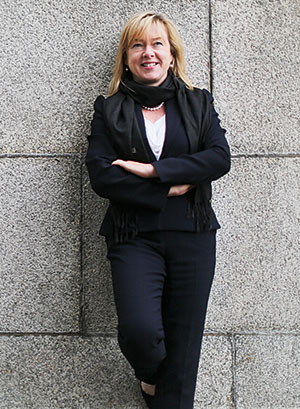On many levels Susan Hart is a surprising business school dean. She is one of the few women to have made it to the top of a business school, to be sure, but the dean of the University of Strathclyde Business School, in Glasgow, also unashamedly pursues the practical alongside the academic.
从许多方面来看,位于格拉斯哥的斯特拉思克莱德大学商学院(University of Strathclyde Business School)的院长苏珊•哈特(Susan Hart)都是一位令人惊讶的商学院院长。无可否认,她是为数不多的成功升任一家商学院院长的女性之一,但在追求学术成就的同时,她也问心无愧地讲求实际。
“We have a very clear policy that everything has to link with the world of practice,” says the ebullient marketing professor, now six years a dean. “If you are not connecting your students to the world of practice, you are doing something wrong.”
“我们有一项很明确的政策,就是一切都必须与现实世界相挂钩,”这位热情洋溢的市场营销教授说。她现在已当了6年院长。她说:“如果你不让学生跟现实世界相联系,你就错了。”

The approach is perhaps unsurprising for a university in Scotland’s industrial heartland that has built its reputation on strengths in technology as well as entrepreneurship, and which also espouses the notion of “useful learning”.
斯特拉思克莱德大学采取这一策略或许并不出奇——它所在的格拉斯哥市是苏格兰的工业中心、凭借在科技和创业方面的实力创下盛名,该大学也支持“有用学习”的观念。
In practical terms this means Prof Hart spends time courting the support of a cadre of business executives to be academic fellows at the school. “We can’t make it the way business wants it to be unless they come and help us,” she reasons.
从现实角度而言,这意味着哈特教授会花费时间争取公司高管的支持,让他们成为商学院的研究人员。“如果不请他们过来帮我们,我们就无法把学校办成企业想要的样子,”她解释道。
Given that Prof Hart’s education and career have taken place almost entirely within the Scottish higher education system, she has an additional role that is perhaps unusual too – she is leader of international activities for the whole of Strathclyde University.
鉴于哈特教授的教育经历和职业生涯几乎完全局限在苏格兰高等教育体系内,她的另外一个角色可能也是非同寻常的——她是斯特拉思克莱德大学所有国际活动的负责人。
However, even a rudimentary perusal of the business school’s teaching and research shows why. To begin with, the school runs programmes in nine countries. But more significantly, everything taught there is designed around an international agenda. This is as much a necessity for those entrepreneurs setting up their own businesses in Scotland’s largest city as is it for those who join the corporate world, says the garrulous dean.
然而,粗略浏览该商学院的教学和研究情况,就能看出其中原因。首先,该商学院在9个国家开展业务。但更引人注目的是,商学院的所有授课内容都是围绕着一项国际议程设计的。这位健谈的院长表示,这么做对那些投身公司界的人、以及对那些在苏格兰大城市自行创业的人来说,都是同等必要的。
“We have students who have gone on to create small businesses, but the market is global, especially if the company is selling luxury and niche products,” she says. “If you’re a fashion designer, where do your fabrics come from? Even local companies will have influences and dependencies internationally.”
“我们的一些学生已向前一步,创立了小型企业,但市场是全球性的,尤其是如果他们的公司出售奢侈品或小众产品的话。”她说,“如果你是一名时尚设计师,你的布料从哪里来?即便是本地公司都会产生国际影响,并对国际市场产生依赖。”
When quizzed about what she would nominate as the school’s flagship programme, the dean is pensive and equivocal. Certainly the school has a strong undergraduate programme, she says, and it is increasingly successful in introducing specialised master’s degrees – Strathclyde will launch a global energy management degree in Abu Dhabi in 2015, and an MSc in leadership in sustainable cities next year as well.
当被追问她认为学院的旗舰项目是什么时,这位院长沉思了一会儿,然后做出了模棱两可的回答。她表示,学院拥有实力很强的本科教育项目,推出的专业硕士学位教育项目也越来越成功——斯特拉思克莱德商学院将于2015年在阿布扎比(Abu Dhabi)推出一项全球能源管理学位教育项目,下一年还将推出一项可持续城市领导力方面的理科硕士(MS)项目。
The MBA has also been revamped and has changed dramatically in the past four years, according to the dean. General management has been updated with a technology focus and the careers office has moved up a gear.
这位院长称,学院在过去4年里也对MBA项目进行了大刀阔斧的调整与改革。学院按照以科技为重心的原则对整个管理进行了改进,就业办公室的工作也上了一个台阶。
But the biggest change has been the increased flexibility that has enabled MBA students to study in any of the nine countries where the school operates. The school is particularly strong in the Middle East, teaching in Bahrain, Oman, Dubai and Abu Dhabi, but also has facilities in Greece, Switzerland, Singapore, Hong Kong and Malaysia.
但最大变化是增加了灵活性,使MBA学生可以在该学院分布于九个国家的任何一个授课点参加学习。该学院在中东地区实力尤为强大——授课地点有巴林、阿曼、迪拜和阿布扎比,不过它也在希腊、瑞士、新加坡、香港和马来西亚授课。
“A part-time student in Glasgow can study a module in any of the other centres,” says Prof Hart – for example, learning about logistics in Dubai or Singapore. Online learning is also being introduced on all campuses.
“格拉斯哥的非全日制学生,可以参与其他任何一个授课点的课程学习,”哈特教授说,比如学习迪拜或新加坡的物流课程。所有分校园也都在引入在线授课方式。
This increased flexibility has been one of the hallmarks of Prof Hart’s tenure as dean, but she is swift to point out that an increased focus on research has also been central to her development of the school. Indeed, she was appointed dean in 2008 following a very successful stint as vice-dean for research at the business school. She insists, though, that it is academic research with a practical application.
一直以来,这种灵活性的提高已成为哈特教授担任院长的特色之一,但她迅速指出,学术研究也是她在学院发展方面的工作重点。事实上,她在2008年被任命为院长,正是因为此前她在担任商学院负责研究的副院长时成绩斐然。不过,她坚称,她所注重的学术研究是结合实际应用的学术研究。













